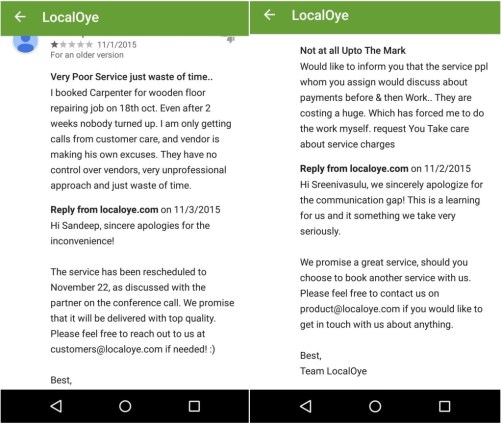My ZipGo ride was cancelled almost last minute, leaving me livid, mildly inconvenienced. However, before I could use my superpower as an internet user and post some scathing tweets about the experience, the founder personally called and apologized and explained the reason for the cancellation. I couldn’t help but be mellowed, even feel sad for the helpless entrepreneur, limited by the vagaries of the vendors he works with.
It’s only human to make mistakes. We all do it. Companies do it too for they are also run by humans. More often than not a mistake by a representative of the company can have far-reaching consequences. It can cause PR disasters, but worse a loss of customers you’ve worked hard to acquire. Sachin Tendulkar probably won’t be using British Airways anytime soon after their recent faux pas with the cricketing legend.
Most big companies usually have dedicated PR cells to deal with screw-ups, but startups more often than not, fumble with dealing with their mistakes. Startups incidentally are also more prone to making booboos in the process of starting up and learning the tricks of the trade. Open the Facebook page of any startup, and more than gushing compliments about the innovative service and how easy it makes life, you’d come across a barrage of angry customers lashing out at the company for the smallest of grouses and gaps in the service.

However the good news is that startups also have an opportunity to make up for their mistakes more agilely than the bigger companies which can get stuck in a loop of chains of approvals, and bureaucracy.
No matter what the issue is – tiny or big – a sincere apology can go a long way in mitigating an angry customer or public. Sometimes it’s not even the company that’s at fault, but the customer herself who’s overlooked the terms and conditions of her service or simply been negligent, but as they say, the customer is the king, and whoever holds the wallet, wears the pants.
Gone are the days when companies could get away with just poor service, substandard products or a PR disaster, by oiling the media or using some other tactics. Now-a-days every move is being watched, and the company will do well to own up, and offer the humble apology.
Just an apology won’t suffice, how it’s framed, who it comes from, and when it’s issued is also equally important.
Here’s some shining examples of when the biggies from a company personally.
1. Allen Solly does an imposition!
A twitter use pointed out a grammatical error at one of Allen Solly’s stores. Instead of the regular “we’ll look into it” spiel that brands usually pull off, here’s what Allen Solly came up with. The creative apology won hearts all around.
2. Uber is Uber sorry
During the terrorist-led hostage crisis in Sydney last year, Uber was accused of hiking up its fare and using surge pricing instead of offering relief in a time of a distress. Realising it had screwed up, Uber issued a long, heartfelt apology over the error.
3. Flipkart founders eat humble pie
Who can forget the epic reply the Flipkart founders, when their ambitious Big Billion Day sale in 2014 didn’t quite go as expected and ended up making Flipkart a butt of ridicule in its wake. However, the apology helped mellow down the angry sentiment against Flipkart. That their Big Billion Days sale was bigger and better this year, is a story for another day.

4. Travelyaari bundles up a discount with an apology
Another way to mitigate an angry customer after an error from the company’s end is to of course sweeten the deal with a discount. When a bus booking didn’t go through, Travelyaari quickly sent me an apology and a discount to make up for my “inconvenience”. This approach isn’t always needed, however, it’s great when apologies aint just words and brands put their money where their mouth is.

5. Paytm CEO personally looks into it.
A user complained about a hitch with her account on Paytm, and tweet to her personally, the founder and CEO himself did!
6. LocalOye takes its reviews seriously
Apologies don’t always need to be a PR statement. For example, just a casual scroll through the Playstore led me to this curious observation. LocalOye, the hyperlocal servie provider app, replied on each and every complaint it received on its app.
7. Lenskart shakes off a public outrage
When Lenskart really pushed it with its insensitive message offering a discount to “shake off” the earthquake in Nepal, it duly and justifiably incurred the wrath of the public. The brand issued an apology following the SMS, followed by personal apology on the blog.
8. ScoopWhoop does an Oops!
During the same time, ScoopWhoop did a Scoopwhoop and in a case of severe misjudgment, ran a deeply insensitive article listicle about “Top 10 feelings during an earthquake”. However the media house realised it in time, and the editor personally issued this apology, along with a vow to contribute a part of her salary towards earthquake relief.
To sum up, a mistake whether big or small, whether the company’s fault, a case of miscommunication or just an unreasonable customer’s work, an apology can go a long way in winning back the customer. Add to a simple apology, some heart, some soul, and a little creativity, and you can help secure more good PR for your company than thousands in ad monies can do.




